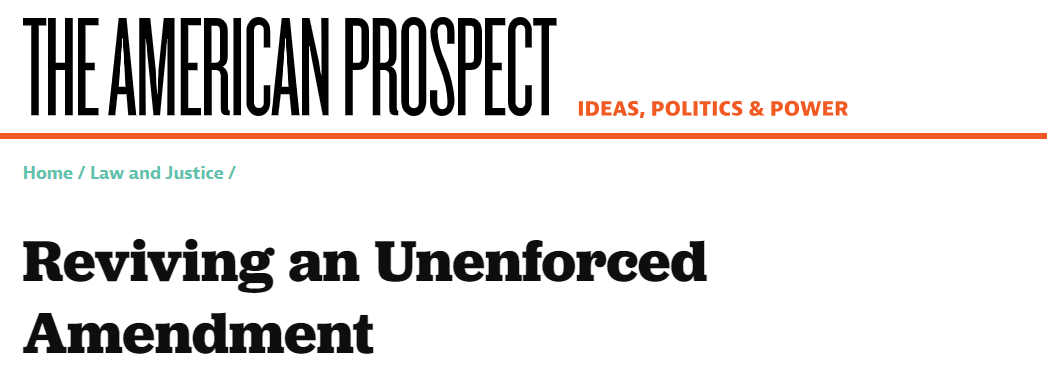Welcome to DU!
The truly grassroots left-of-center political community where regular people, not algorithms, drive the discussions and set the standards.
Join the community:
Create a free account
Support DU (and get rid of ads!):
Become a Star Member
Latest Breaking News
General Discussion
The DU Lounge
All Forums
Issue Forums
Culture Forums
Alliance Forums
Region Forums
Support Forums
Help & Search
General Discussion
Related: Editorials & Other Articles, Issue Forums, Alliance Forums, Region ForumsWill a constitutional promise to protect the right to vote get buried again? An appeals court in DC is about to tell us.

https://prospect.org/justice/2024-04-18-reviving-unenforced-amendment-voting-rights/

Sometimes a potentially seismic shift in the law is masked by opaque and technical legalese. So it was last week, when a federal court of appeals in Washington struggled to decide whether a nongovernmental organization that seeks to improve democratic elections was sufficiently injured—making it eligible for so-called standing to sue—to have its day in court to enforce a never-used provision of the Constitution. The 435 seats in the House of Representatives are apportioned among the states according to their population as determined by the decennial census. If the NGO is successful, some of those apportioned seats could be taken away from states that prevent citizens from exercising their right to vote. But though this possibility has been outlined in the Constitution for 156 years, most everything about this case, which attempts to actually utilize it, is uncertain.
The setting was as unusual as the case. The D.C. Circuit Court of Appeals has a tradition of occasionally holding proceedings in one of the District’s six law schools instead of its downtown courthouse. The students at Catholic University’s Columbus School of Law who followed the burst of questions posed by three well-prepared judges were exposed to a potential decision that could end the case on technical grounds or, if allowed to go to trial, not only change the political control of the House of Representatives but also dramatically alter the composition of the Electoral College. The case was brought by Citizens for Constitutional Integrity and its members to force the Census Bureau to reapportion representatives in the House. As I’ve written before in the Prospect, Citizens’ lawyer Jared Pettinato argues that Section 2 of the 14th Amendment, ratified in 1868, requires the number of representatives be reallotted from states that burden the franchise, say with ID laws or other restrictions, whether or not they impact only minority voters.
In 1870, the Census Bureau attempted to collect disfranchisement statistics. But much to the frustration of Republican congressmembers, who wanted to keep former Confederate states from gaining members even though they stopped freed slaves from voting, the Bureau didn’t have the expertise or resources to make the count. In the decades that followed, efforts to use Section 2 to protect the right to vote foundered due to lack of political will in Congress and standing to sue requirements from the judiciary. Citizens for Constitutional Integrity’s lawyer, Pettinato, is a former Department of Justice attorney. He knows the ins and outs of standing law from the perspective of both the government and private litigants. He strongly believes the trial court, which dismissed the case last year, made a fatal error in applying the standing doctrine. (Full disclosure: As a lawyer who brought a Section 2 case in the 1960s, I was invited by him to sit at the counsel table during the argument.)
Pettinato admitted that he was delighted when he learned he would argue before three judges nominated by Democratic presidents. But he refused to betray even a hint of optimism about the ultimate result. Even though Wisconsin had used an ID law to block over 300,000 potential voters, leading an expert he had retained to conclude that the states of New York or Pennsylvania would regain at least one representative lost after the 2020 census, the government responded that the shift was purely speculative, a position that has usually been accepted by the courts in most previous efforts to enforce Section 2. Sarah J. Clark, the DOJ lawyer representing the Census Bureau, a former law clerk for the very court she was in front of, took the position that, despite the Wisconsin statistics, Citizens for Constitutional Integrity failed to really show that any states would necessarily gain an additional representative as a result. She also argued that the Bureau wasn’t authorized by statute to collect data about state efforts to restrict voters.
snip
InfoView thread info, including edit history
TrashPut this thread in your Trash Can (My DU » Trash Can)
BookmarkAdd this thread to your Bookmarks (My DU » Bookmarks)
1 replies, 220 views
ShareGet links to this post and/or share on social media
AlertAlert this post for a rule violation
PowersThere are no powers you can use on this post
EditCannot edit other people's posts
ReplyReply to this post
EditCannot edit other people's posts
Rec (6)
ReplyReply to this post
1 replies
 = new reply since forum marked as read
Highlight:
NoneDon't highlight anything
5 newestHighlight 5 most recent replies
= new reply since forum marked as read
Highlight:
NoneDon't highlight anything
5 newestHighlight 5 most recent replies
Will a constitutional promise to protect the right to vote get buried again? An appeals court in DC is about to tell us. (Original Post)
Celerity
Apr 18
OP
"Even though Wisconsin had used an ID law to block over 300,000 potential voters, .. "
Firestorm49
Apr 18
#1
Firestorm49
(4,036 posts)1. "Even though Wisconsin had used an ID law to block over 300,000 potential voters, .. "
I find that number rather uncertain. As of right now I have not googled to verify but 300,000 seems quite an exaggeration.